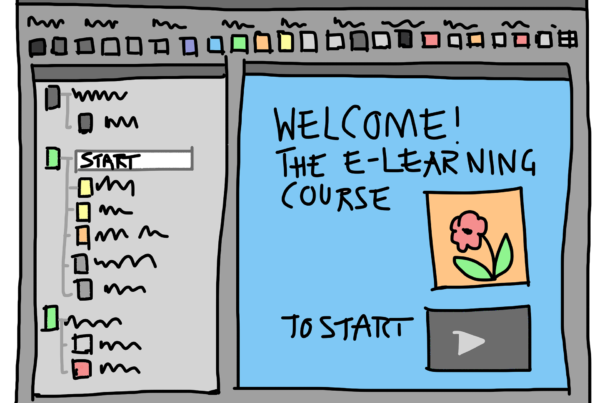

When UvA announced their measures against Covid-19, we students spent our time deciding whether to go home, attempted to study with the new ‘online’ system and were battling with other personal or situational struggles. Often, when we’re wound up in our own battles, we fail to see how others are struggling. Around a month ago, I had a chat with my aunt, a college professor in the US, who briefly shared with me how she was having trouble with distance education — her attempts to support her students and ensure they were able to cope with the course wasn’t met with equal effort from the students. On top of this, she was going to have to buy a new microphone and figure out how to get the content online for her students. I could hear the stress in her voice — it was evident that teachers weren’t having it easy at all. This made me reflect on our own situation at the UvA and appreciate the work that the faculty is putting in to ensure we don’t face study delays. With this thought in mind, I was inspired to write this column. I contacted my tutorial teacher, also the first-year tutorial coordinator, Tiel van Kersbergen, to briefly understand what’s been happening behind the scenes at UvA.
When the announcement was made that on-site education had been postponed, there was mayhem all around and students were desperately waiting for more information. However, the tutorial teachers were in the dark as well, waiting for the university to give them further instructions. After it was established that the UvA was going to work towards avoiding study delays, Tiel and his team had quite a task ahead of them. They had already poured in a great deal of time and effort planning live tutorial sessions. Thus, the team then spent a hectic couple of weeks after the university’s closing to familiarise themselves with the online tools and features that Canvas offered. The current challenge at hand, though, is the propaedeutic thesis. This requires more in-person guidance and consultation. While it is hard to organise this online, some alternatives are being tried out. Preparatory and replacement assignments contain detailed steps to navigate databases and individual meetings with our tutorial supervisors is also an option.
Although the team had found new ways to continue delivering the course, there were still communication challenges. As a team, tutorial teachers were used to consulting each other on different matters, but such instant communication isn’t possible now since everyone isn’t working in a common space. Especially for the propaedeutic thesis, since students pick topics that their tutorial teacher might not be as familiar with, quick consultation with other teachers was helpful. With regard to students though, mentor meetings have become difficult. Especially more so considering the stress caused by the present state of affairs in addition to students’ personal situations. Tiel feels that he isn’t able to support his students or be available for them as much as he’d like to. Additionally, he misses the feeling of knowing he’s going to meet his students that day. For him, the lockdown has taken away the most enjoyable part of his work — teaching.
On a broader level though, the coronavirus situation compelled the UvA, which is usually more decentralised, to come together and formulate common measures. In this process, the main policy makers needed a lot of information about students which the tutorial teachers and study advisors were more aware of. In order to understand the implications of the measures taken for first year students and gain other insights, more dialogue ensued between the tutorial teachers and the higher authorities. For instance, tutorial teachers were asked if they had any knowledge of what international students were planning to do after the measures were announced. Through these discussions, they aimed to make better decisions for students.
Lecturers too have been facing their own set of struggles. Offering the exam online has been challenging, especially since online exams are more vulnerable to cheating. Furthermore, there is nobody who can tell them whether they’re doing things right or wrong since this is a new situation for everyone.
Overall, the faculty has been weighing out the factors involved in every decision, seeing what cannot be compromised on, and trying to ensure they can deliver the best educational experience in these circumstances. Additionally, all these decisions had to be taken in a matter of days, which contributed to the stress. Lastly, Tiel highlights that this is a two-sided affair and student feedback is very crucial for the online courses. Since the tutorial team is very open to feedback, he strongly encourages students to share their thoughts. These are trying times, but the only thing that will keep us afloat is effort and support from both stakeholders — the faculty and students.
Photo by Dylan Gillis.

When UvA announced their measures against Covid-19, we students spent our time deciding whether to go home, attempted to study with the new ‘online’ system and were battling with other personal or situational struggles. Often, when we’re wound up in our own battles, we fail to see how others are struggling. Around a month ago, I had a chat with my aunt, a college professor in the US, who briefly shared with me how she was having trouble with distance education — her attempts to support her students and ensure they were able to cope with the course wasn’t met with equal effort from the students. On top of this, she was going to have to buy a new microphone and figure out how to get the content online for her students. I could hear the stress in her voice — it was evident that teachers weren’t having it easy at all. This made me reflect on our own situation at the UvA and appreciate the work that the faculty is putting in to ensure we don’t face study delays. With this thought in mind, I was inspired to write this column. I contacted my tutorial teacher, also the first-year tutorial coordinator, Tiel van Kersbergen, to briefly understand what’s been happening behind the scenes at UvA.
When the announcement was made that on-site education had been postponed, there was mayhem all around and students were desperately waiting for more information. However, the tutorial teachers were in the dark as well, waiting for the university to give them further instructions. After it was established that the UvA was going to work towards avoiding study delays, Tiel and his team had quite a task ahead of them. They had already poured in a great deal of time and effort planning live tutorial sessions. Thus, the team then spent a hectic couple of weeks after the university’s closing to familiarise themselves with the online tools and features that Canvas offered. The current challenge at hand, though, is the propaedeutic thesis. This requires more in-person guidance and consultation. While it is hard to organise this online, some alternatives are being tried out. Preparatory and replacement assignments contain detailed steps to navigate databases and individual meetings with our tutorial supervisors is also an option.
Although the team had found new ways to continue delivering the course, there were still communication challenges. As a team, tutorial teachers were used to consulting each other on different matters, but such instant communication isn’t possible now since everyone isn’t working in a common space. Especially for the propaedeutic thesis, since students pick topics that their tutorial teacher might not be as familiar with, quick consultation with other teachers was helpful. With regard to students though, mentor meetings have become difficult. Especially more so considering the stress caused by the present state of affairs in addition to students’ personal situations. Tiel feels that he isn’t able to support his students or be available for them as much as he’d like to. Additionally, he misses the feeling of knowing he’s going to meet his students that day. For him, the lockdown has taken away the most enjoyable part of his work — teaching.
On a broader level though, the coronavirus situation compelled the UvA, which is usually more decentralised, to come together and formulate common measures. In this process, the main policy makers needed a lot of information about students which the tutorial teachers and study advisors were more aware of. In order to understand the implications of the measures taken for first year students and gain other insights, more dialogue ensued between the tutorial teachers and the higher authorities. For instance, tutorial teachers were asked if they had any knowledge of what international students were planning to do after the measures were announced. Through these discussions, they aimed to make better decisions for students.
Lecturers too have been facing their own set of struggles. Offering the exam online has been challenging, especially since online exams are more vulnerable to cheating. Furthermore, there is nobody who can tell them whether they’re doing things right or wrong since this is a new situation for everyone.
Overall, the faculty has been weighing out the factors involved in every decision, seeing what cannot be compromised on, and trying to ensure they can deliver the best educational experience in these circumstances. Additionally, all these decisions had to be taken in a matter of days, which contributed to the stress. Lastly, Tiel highlights that this is a two-sided affair and student feedback is very crucial for the online courses. Since the tutorial team is very open to feedback, he strongly encourages students to share their thoughts. These are trying times, but the only thing that will keep us afloat is effort and support from both stakeholders — the faculty and students.
Photo by Dylan Gillis.



